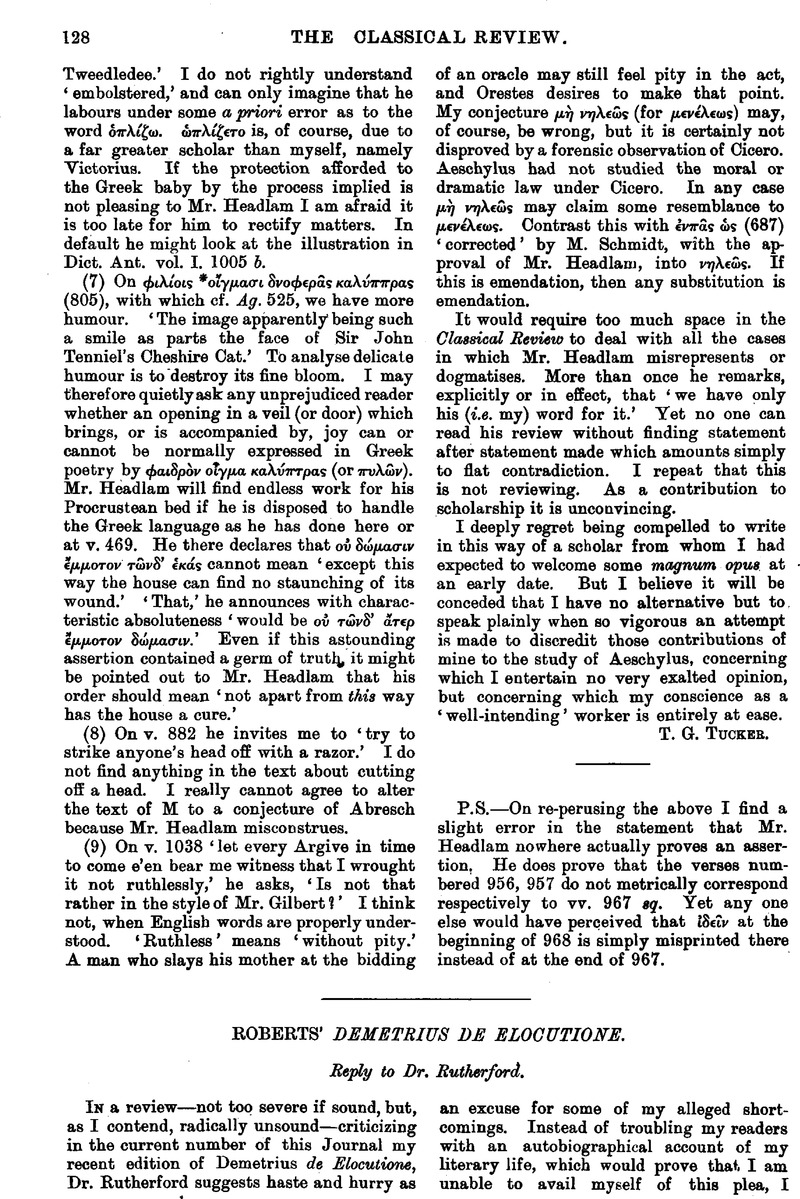No CrossRef data available.
Article contents
Roberts' Demetrius de Elocutione - Roberts' Demetrius de Elocutione
Published online by Cambridge University Press: 27 October 2009
Abstract

- Type
- Reviews
- Information
- Copyright
- Copyright © The Classical Association 1903
References
page 129 note 1 In the matter of Date and Authorship (as indeed in many other matters) the most recent German editor Radermacher and I have independently reached very similar conclusions: based, for the most part, on a study of the language and the grammar of the treatise. It may be well to add that, when I undertook the publication of the De Elocutione, I had not heard that a critical edition, on modern lines, was elsewhere in preparation.
page 129 note 2 From this point onward it will be understood that the words in italics are those used by Dr. Rutherford himself when reviewing Demetrius on Style.
page 130 note 1 As soon should I imagine that when Plutarch, in his Life of Marius c. 3, mentions γλαφυρν βον, he has in mind the ‘light’ life of the town. But really, what ‘lightness’ is in style I scarcely know.
page 130 note 2 There is in the reviewer's language as above quoted a small inaccuracy, unnoticed so far, to which I shall only refer as a mote moving on the surface and showing how the current goes. He speaks perhaps because in his haste he has confined his turn for search to § 128) as though λγος were Demetrius’ regular term for ‘style.’ The truth is that here Demetrius is using not technical but popular language, his technical term for ‘style,’ in the sense here meant, being χαρακτρ. A small point, I repeat; but such small points create, in the long run, an odd sense of mystification and of insecurity.
page 131 note 1 It would have been a real service to scholarship had Dr. Rutherford helped in tracing to their source the too numerous illustrations unassigned in my edition. Some of these are probably invented examples, but there are no doubt others which could be found somewhere in extant Greek literature if only we were to carry our search far enough. Again, it would have been a useful thing had he made some remarks on the connexion of Demetrius de Elocutione with Aristotle's Rhetoric and Theophrastus’ treatise On Style. I have said something on this subject in my edition, but by no means all.
page 131 note 2 If my memory serves me (I have not the volume within reach where I write) a similar view was not long ago expressed, in a notice (in the Revue de Philologie) of my Longinus and Dionysius by the distinguished scholar M. Albert Martin, author of ‘Les scolies da manuscrit d'Aristophane à Ravenne : Étude et collation,’ published in 1882.
page 132 note 1 For verbal points of this kind, cp. C.R. xvi. 386b, xvii. 79a. Professor Seymour's article illustrates the difficulty of translating not only νακληρος (which can be applied even to a ‘doss-man’), but also κνβερντης (π. ρμ. § 78, where Demetrius clearly has Demosth. de Cor. § 194 in mind : a fact that throws light on the meaning of στρατηγς here and elsewhere in the π. ρμ) The Elizabethan translators have much to teach us in these matters : cp. Sir Thomas North's ‘that he had continued treasurer under his captain the space of three years,’ as a rendering of a passage in Plutarch's Life of C. Gracchus c. 2 ταμιεων (‘acting as quaestor') δ τῷ στρατηγῷ (‘praetor’, or more strictly ‘proconsul’ here) παραμεμενηκναι τριεταν.
page 132 note 2 It is noteworthy that so diligent a student of the Attic writers as Dionysius never (so far as I know) uses the phrase ἱερ κα ᝅσια in the special Attic meaning. Instead, he uses such expressions as κ παντς ἱερο κα βεβλον τπου (Antiq. Rom. vii. 8).
page 133 note 1 It is, perhaps, to be regretted that Dr. Rutherford was not Romanist enough to visit just for once the locus paenitentiae, p. 239. He would there have found the needed reference.




